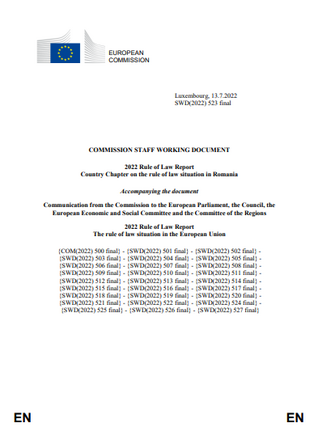
The Rule of Law Report in Romania constitutes an additional assessment informing on its progress on the benchmarks set by the Cooperation and Verification Mechanism, a transitional tool established in 2007 to assist the country in implementing relevant reforms in the rule of law domain.
The Romanian justice system is undergoing structural reforms aiming at ensuring the independence of the judiciary while enhancing the quality and efficiency of the judicial system. The envisioned revision will constitute the first comprehensive judicial reform since 2004. The Rule of Law Report draws attention to the need to address the challenges posed by the extensive powers and lack of accountability of the Chief Judicial Inspector. In March 2022, the Romanian government adopted a new judicial strategy and action plan setting specific objectives aimed at improving justice’s independence, quality and efficiency, as well as facilitating citizens’ access to justice.
An anticorruption strategy was adopted by the Romanian government in 2021, setting five goals: ensuring the application of integrity measures at organisation level; reducing the impact of corruption on citizens; strengthening management and capacity of institutional bodies to prevent and combat corruption; reinforce integrity in key domains such as healthcare, public procurement and local administration; enhance criminal laws and administrative means directed to corruption fighting. The report stresses that the effectiveness of Romania’s anti-corruption strategy relies on the support that political actors will grant to the implementation of legislative reforms.
As far as the media pluralism and media freedom chapter, the report calls on Romanian authorities to implement the 2018 Audiovisual Media Services Directive. The document also expresses the concern of the Commission regarding the transparency of Romanian media ownership, as well as the parliamentary delays in amending the freedom of information act. The report also signals a worsening of the registered cases on threats, harassment and violence against journalists and environmental activists. Furthermore, the report draws attention to the lack of a comprehensive protection of whistleblowers.
The European Commission recommends strengthening the rules and mechanisms to enhance the independent governance and editorial independence of public service media taking into account the European standards.
Looking at the other institutional issues related to checks and balances, frequent changes of legislation, regular use of emergency ordinances and the limited practice of public consultations continue to raise concerns. Other concerns remain regarding the challenge to the principle of primacy of EU law posed by the Constitutional Court. The Institute for Human Rights is seeking accreditation as National Human Rights Institution, while there are plans to simplify registration procedures for non-governmental organisations.
Tags: Romania Media freedom Media ownership Public broadcasting Whistleblowing Rule of LawThe content of this article can be used according to the terms of Creative Commons: Attribution-NonCommercial 4.0 International (CC BY-NC 4.0) . To do so use the the wording "this article was originally published on the Resource Centre on Media Freedom in Europe" including a direct active link to the original article page.

